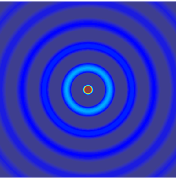 Image via Wikipedia
Image via WikipediaAn example would be from the appearance of the angel. A person with a naturalistic interpretation could say that the event was staged by a huckster , an extremely improbable event, or a shared illusion -- all using well understood natural laws. In turn, a supernaturalist could conclude that, at each stage, some supernatural intercession was necessary to invoke each natural event. Then, the naturalist could conclude that each of these supernatural stimuli -- if present -- was the result of some sort of natural laws governing the stimuli. And so on.
Also, we can consider quantum mechanics. At it's basis, the fundamental laws of quantum mechanics describe the behavior of of a particle at low energies, with one of the fundamental aspects of QM (depending on your philosophical interpretation of what's happening) being the evolution of the wave function according to the Schrodinger equation: H *\psi = E *\psi for the time independent version of the equation, which could be understood at the Hamiltonian operator acting on the wave equation being equal to a constant times the wave equation. As a fundamental part of that, the wave function is said to collapse into an observable state under observation, with the probability of the particle being located at a given point in space being equal to the wave equation times by it's complex conjugate integrated over all of space (if I remember my elementary quantum mechanics correctly).

However, what is actually happening when the wave function "collapses"? If you look at different interpretation of QM (many of which are summarized nicely) on Wikipedia, you will find everything from the idea that the universe splits off into different branches with each split to the idea that a collapse is caused by the consciousness of the observer and has no meaning outside of that reality. So, even among the "naturalistic" worldviews, there are large variations in what people think is happening behind the scenes in something like wave function collapse.
By the same token, a supernatural worldview could imagine a smart little elf sitting at a magical keyboard each time an observable event takes place and "allowing" that event to occur each time by hitting a button. Then, a naturalist viewpoint could say that, if the elf exists, science can explain it away as the result of some previously unknown natural laws, which a supernaturalist can explain away as the result of an even more powerful elf at an even more complex keyboard, and so on.
With the flood of Noah, a naturalist can point to scientific evidence that the flood never occurred by pointing to evidence that the ark would have been to small, there isn't enough water in the world, the geological record doesn't support a world wide flood, etc. A supernaturalist could then come up with a series of miracles or improbable explanations to explain away these problems, including the power of God to control the animals, the introduction and retraction of water from heaven by angels, and the altering of the geological record by the devil. Then, a naturalist could find additional objections to these new theories, which the supernaturalist could then explain away by further invoking miracles, and so on. There really is no way to distinguish between these possibilities in this case or in any other scenario.

At this point, physics usually throws up its collective hands and uses what is called a "black box" model for events in nature. In other words, physicists can observe a system with possibly complex internal component only in terms of the available inputs and outputs of the system and not on the basis of possibly extremely complex interactions occurring inside of the system itself. There are many situation in science when there exist several experimentally consistent models of what is happening inside of the black box that can only be compared scientifically once experimental tools have been discovered to penetrate the black box and discover more about the working parts of that box.
Also, it should be noted that, even in QM itself, there are room for extremely unlikely events to occur. One such event is called "quantum tunneling", where a particle ensemble has a finite probability to penetrate a potential energy barrier and emerge on the other side of that barrier. Mathematically, this can be understood from the wave equation existing at all points in space with an finite (nonzero) value, even though the probability is bounded by an exponentially decreasing envelope. The probability of a tunneling even to occur is inversely proportional to the mass of the particle ensemble, meaning that it happens quite often for small subatomic particles and much less often for more massive particles. However, the gist of this argument is that there is a nonzero probability that, according to the laws of QM, [b]you could be standing next to a wall and suddenly appear on the opposite side of the wall[/b]. Numerically, the probability of this happening is so small that we would not expect it in the lifetime of the universe; however, the probability is still nonzero.
Ah, the joys of quantum mechanics.

